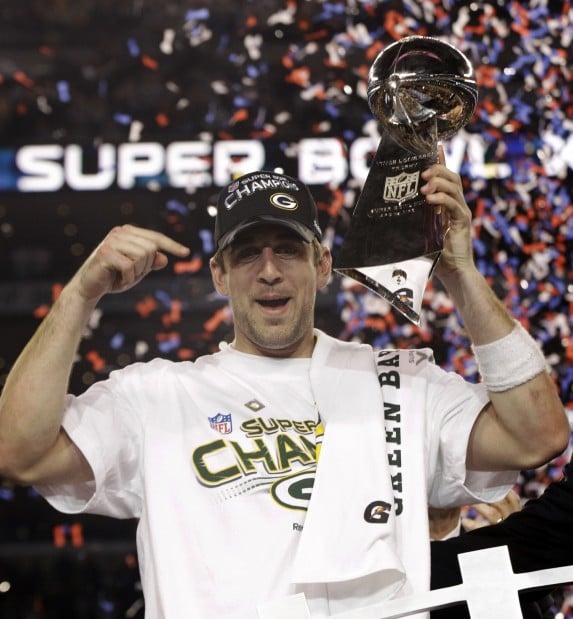Aaron Rodgers' Super Bowl Wins: A Deep Dive!
Has Aaron Rodgers truly cemented his legacy as an all-time great quarterback? His Super Bowl XLV victory with the Green Bay Packers, coupled with a career marked by exceptional regular season performances, undeniably places him amongst the elite. This singular achievement, however, forms the crux of a debate that continues to swirl around the future Hall of Famer.
The narrative surrounding Aaron Rodgers and his quest for multiple Super Bowl rings is complex, filled with both triumphs and tantalizing "what ifs." While his individual brilliance is rarely questioned his arm talent, accuracy, and pre-snap reads are legendary the ultimate measure of a quarterback often lies in the hardware. And in this arena, Rodgers' resume, while distinguished, is perhaps not as decorated as some of his contemporaries or predecessors. This examination delves into the intricacies of Rodgers' Super Bowl win, comparing and contrasting his achievements with others who have reached the pinnacle of the sport.
| Aspect | Details |
|---|---|
| Full Name | Aaron Charles Rodgers |
| Date of Birth | December 2, 1983 |
| Place of Birth | Chico, California, USA |
| Height | 6 ft 2 in (1.88 m) |
| Weight | 225 lb (102 kg) |
| Position | Quarterback |
| College | University of California, Berkeley |
| NFL Draft | 2005, 1st Round, 24th Overall (Green Bay Packers) |
| Years in NFL | 2005-2023 (Green Bay Packers, New York Jets) |
| Super Bowl Wins | 1 (Super Bowl XLV) |
| Super Bowl Appearances | 1 (Super Bowl XLV) |
| Regular Season MVP Awards | 4 (2011, 2014, 2020, 2021) |
| Super Bowl MVP Awards | 0 |
| Career Passing Yards | 59,322 |
| Career Passing Touchdowns | 475 |
| Career Interceptions | 105 |
| Pro Bowl Selections | 10 |
| All-Pro Selections | 4 |
| Reference | NFL.com Player Profile |
The 2010 season, culminating in Super Bowl XLV, represents the zenith of Rodgers' career, at least in terms of team success. The Green Bay Packers, under the guidance of head coach Mike McCarthy, navigated a difficult NFC playoff bracket. They defeated the Philadelphia Eagles and the Atlanta Falcons on the road before triumphing over their archrivals, the Chicago Bears, in the NFC Championship game. This set the stage for a Super Bowl showdown against the Pittsburgh Steelers.
The Super Bowl itself, played at Cowboys Stadium in Arlington, Texas, on February 6, 2011, was a hard-fought contest. Rodgers showcased his precision passing, completing 24 of 39 passes for 304 yards and three touchdowns. He was named the Super Bowl MVP, a fitting reward for his masterful performance. His ability to extend plays, find open receivers, and make decisive throws under pressure was on full display. The Packers ultimately prevailed with a 31-25 victory, adding another Lombardi Trophy to their storied franchise's collection.
This victory served as the ultimate validation of Rodgers' exceptional talent. He had finally broken through the barrier and secured a Super Bowl win, something that had eluded him in his early years as a starter. The performance also provided a definitive answer to any lingering doubts about his ability to perform on the biggest stage. It appeared, for a moment, that this could be the first of many Super Bowl triumphs for Rodgers and the Packers.
However, the subsequent seasons presented a different narrative. While Rodgers continued to dominate the regular season, winning multiple MVP awards, the Packers failed to return to the Super Bowl. They often came close, making deep playoff runs, but were repeatedly thwarted by tough opponents and sometimes, self-inflicted wounds. The lack of consistent postseason success has undeniably become a significant talking point in any discussion about his legacy.
The debate surrounding Rodgers' place in NFL history often centers on this dichotomy: the incredible individual talent versus the comparatively limited team success. Comparisons inevitably arise with quarterbacks like Tom Brady, who has seven Super Bowl victories, or even Joe Montana and Terry Bradshaw, who each have four. These individuals have built dynasties, consistently reaching and winning Super Bowls.
Brady, in particular, sets a high bar. His sustained excellence, the numerous Super Bowl rings, and his ability to elevate the play of those around him have made him the standard by which all quarterbacks are judged. Rodgers, despite his undeniable talent and individual accomplishments, falls short in this particular comparison. He has the individual brilliance, but he has lacked the sustained team success on the biggest stage. The ability to consistently get a team to and win a Super Bowl is what separates the great from the truly legendary in the pantheon of quarterbacks.
Rodgers' statistics certainly support his claim to greatness. He boasts a career passer rating that is amongst the highest in NFL history. His touchdown-to-interception ratio is outstanding. He has consistently demonstrated the ability to make every throw, read defenses, and lead his team. His arm strength, accuracy, and athleticism are legendary. These individual attributes have earned him accolades and the respect of his peers.
However, statistics, while important, don't tell the whole story. The Super Bowl win, or lack thereof, is a defining characteristic of a quarterback's career. Its not just about individual performances; its about the collective effort and the ability to elevate a team to championship heights. Rodgers critics will point to his inability to consistently replicate the success of the 2010 season.
The role of the supporting cast must also be considered. Football is a team sport, and a quarterback is only as good as the players around him. The Packers' offensive line, receiving corps, and defense have fluctuated in quality over the years. While Rodgers has often been able to overcome shortcomings in these areas, he cannot single-handedly win every game. The team around a quarterback contributes significantly to achieving championship goals.
Another factor that often influences the discussion about Rodgers' legacy is the era in which he played. He came of age during a time when the AFC, in particular, was dominated by Tom Brady and the New England Patriots. Rodgers and his Packers often found themselves competing with incredibly talented teams. Winning in the NFC was also a challenge with teams like the Seattle Seahawks and San Francisco 49ers dominating the conference during certain periods.
The style of play also impacts the analysis. The modern NFL emphasizes passing more than ever before. Rodgers, as a passer, has thrived in this environment. The rules are designed to protect quarterbacks and encourage offensive production. However, in the context of Super Bowl wins, other quarterbacks who perhaps weren't as prolific in the regular season have thrived in championships, often relying on strong defenses and a consistent running game. This provides another layer of complication when assessing Rodgers' career.
Rodgers time with the New York Jets presents a new chapter in his career. Unfortunately, it began with a devastating Achilles injury early in the season. This setback has, at least for now, added another layer of complexity to his legacy. The hope was that he would lead the Jets to Super Bowl contention. His injury halted that plan. It's possible he will return and lead the Jets, but the chances of winning a Super Bowl are reduced with age.
Ultimately, the debate over Aaron Rodgers legacy will continue. While his singular Super Bowl victory represents a defining moment in his career, the lack of additional rings will undoubtedly be a source of discussion. He may never have the same accolades as Brady, Montana, or Bradshaw, but he has undeniable skills. He is a gifted player who has delighted fans for years and has shown an uncommon ability to perform at a high level. The next few years of his career with the Jets will be a deciding factor, but even now, his impact on the game and his individual achievements are undeniable.
It is important to consider that the NFL landscape is constantly changing, with new teams and players emerging all the time. This makes it difficult to draw definitive conclusions about a player's place in history. Rodgers, despite his single Super Bowl win, remains an all-time great. His regular season dominance is undeniable, and his impact on the sport is something that cannot be ignored. Whether he adds more championship rings in his time with the Jets remains to be seen, but his current legacy is already secured, and it is one of the greatest to ever play the position.
Rodgers' career arc exemplifies the complexities of judging individual greatness in a team sport. His exceptional talent is beyond dispute, as is his leadership and drive. But, the reality of the Super Bowl is that it takes both talent and circumstances. Sometimes, even the most gifted players cannot overcome the hurdles that prevent them from reaching the ultimate goal. Aaron Rodgers will be remembered for his incredible talent, his MVP awards, and that one shining Super Bowl victory. His story serves as a compelling reminder that greatness can be defined in many ways, and the absence of multiple Super Bowl rings doesn't diminish his place among the all-time greats.



